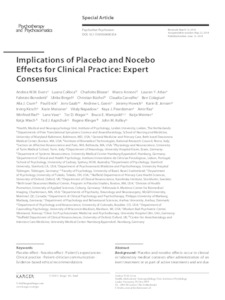Evers, Andrea W. M. and Colloca, Luana and Blease, Charlotte and Annoni, Marco and Atlas, Lauren Y. and Benedetti, Fabrizio and Bingel, Ulrike and Buechel, Christian and Carvalho, Claudia and Colagiuri, Ben and Crum, Alia J. and Enck, Paul and Gaab, Jens and Geers, Andrew L. and Howick, Jeremy and Jensen, Karin B. and Kirsch, Irving and Meissner, Karin and Napadow, Vitaly and Peerdeman, Kaya J. and Raz, Amir and Rief, Winfried and Vase, Lene and Wager, Tor D. and Wampold, Bruce E. and Weimer, Katja and Wiech, Katja and Kaptchuk, Ted J. and Klinger, Regine and Kelley, John M..
(2018)
Implications of Placebo and Nocebo Effects for Clinical Practice: Expert Consensus.
Psychotherapy and Psychosomatics, 87 (4).
pp. 204-210.
![[img]](https://edoc.unibas.ch/style/images/fileicons/application_pdf.png)  Preview |
|
PDF
- Published Version
159Kb |
Official URL: https://edoc.unibas.ch/67828/
Downloads: Statistics Overview
Abstract
Background: Placebo and nocebo effects occur in clinical or laboratory medical contexts after administration of an inert treatment or as part of active treatments and are due to psychobiological mechanisms such as expectancies of the patient. Placebo and nocebo studies have evolved from predominantly methodological research into a far-reaching interdisciplinary field that is unravelling the neurobiological, behavioural and clinical underpinnings of these phenomena in a broad variety of medical conditions. As a consequence, there is an increasing demand from health professionals to develop expert recommendations about evidence-based and ethical use of placebo and nocebo effects for clinical practice. Methods: A survey and interdisciplinary expert meeting by invitation was organized as part of the 1st Society for Interdisciplinary Placebo Studies (SIPS) conference in 2017. Twenty-nine internationally recognized placebo researchers participated. Results: There was consensus that maximizing placebo effects and minimizing nocebo effects should lead to better treatment outcomes with fewer side effects. Experts particularly agreed on the importance of informing patients about placebo and nocebo effects and training health professionals in patient-clinician communication to maximize placebo and minimize nocebo effects. Conclusions: The current paper forms a first step towards developing evidence-based and ethical recommendations about the implications of placebo and nocebo research for medical practice, based on the current state of evidence and the consensus of experts. Future research might focus on how to implement these recommendations, including how to optimize conditions for educating patients about placebo and nocebo effects and providing training for the implementation in clinical practice. (C) 2018 S. Karger AG, Basel
| Faculties and Departments: | 07 Faculty of Psychology > Departement Psychologie > Ehemalige Einheiten Psychologie > Abteilung Clinical Child and Adolescent Psychology
07 Faculty of Psychology > Departement Psychologie > Health & Intervention > Klinische Psychologie und Psychotherapie (Gaab) |
|---|
| UniBasel Contributors: | Gaab, Jens |
|---|
| Item Type: | Article, refereed |
|---|
| Article Subtype: | Research Article |
|---|
| Publisher: | Karger |
|---|
| ISSN: | 0033-3190 |
|---|
| e-ISSN: | 1423-0348 |
|---|
| Note: | Publication type according to Uni Basel Research Database: Journal article |
|---|
| Language: | English |
|---|
| Identification Number: | |
|---|
| edoc DOI: | |
|---|
| Last Modified: | 01 Jul 2020 14:16 |
|---|
| Deposited On: | 16 Jan 2019 15:27 |
|---|
Repository Staff Only: item control page


